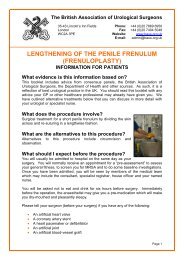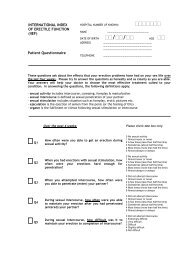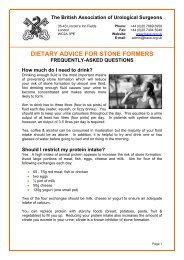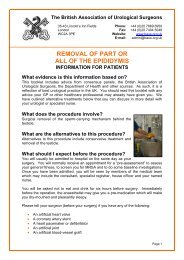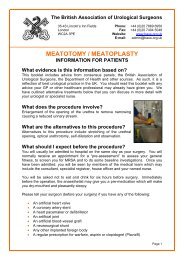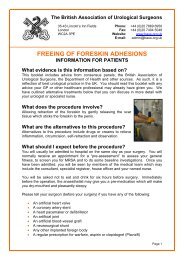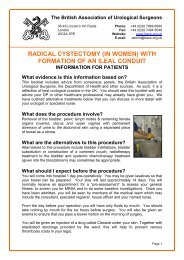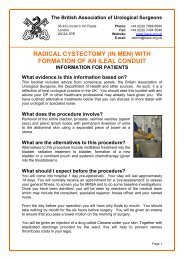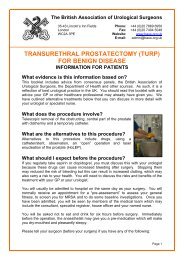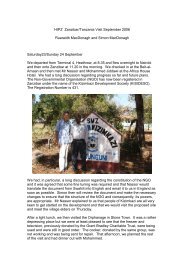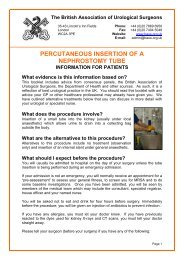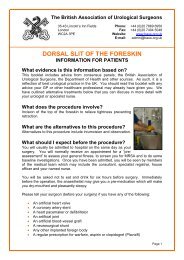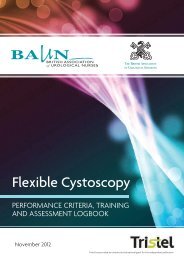MDT (multi-disciplinary team) guidance for managing prostate cancer
MDT (multi-disciplinary team) guidance for managing prostate cancer
MDT (multi-disciplinary team) guidance for managing prostate cancer
Create successful ePaper yourself
Turn your PDF publications into a flip-book with our unique Google optimized e-Paper software.
• Evidence of the benefits of dose escalation has been demonstrated <strong>for</strong> T1−T3 <strong>prostate</strong> <strong>cancer</strong> by<br />
Pollack in a phase III randomised study at the MD Anderson Hospital. 53<br />
o A total of 305 men were randomised between 1993 and 1998 to compare the efficacy of<br />
70 Gy versus 78 Gy with a median follow-up of 60 months. The primary endpoint was FFF,<br />
including biochemical failure, which was defined as three rises in PSA level.<br />
o The FFF rates <strong>for</strong> the 70 Gy and 78 Gy arms at 6 years were 64% and 70%, respectively<br />
(p=0.03).<br />
o Dose escalation to 78 Gy preferentially benefited those with a pre-treatment PSA<br />
concentration >10 ng/ml; the FFF rate was 62% <strong>for</strong> the 78 Gy arm versus 43% <strong>for</strong> those who<br />
received 70 Gy (p=0.01). For patients with a pre-treatment PSA concentration ≤10 ng/ml, no<br />
significant dose response was found, with an average 6-year FFF rate of about 75%.<br />
o Although no difference in OS was observed, the freedom from distant metastasis rate was<br />
higher <strong>for</strong> those with PSA concentrations >10 ng/ml who were treated to 78 Gy (98% versus<br />
88% at 6 years; p=0.056).<br />
• Dearnaley and colleagues have reported their findings from the MRC RT01 study. 54<br />
o In this 3D-CRT trial 843 men were randomised to standard dose of 64 Gy compared to an<br />
escalated dose of 74 Gy with all men receiving neoadjuvant hormone therapy.<br />
o Patients receiving the conventional dose had 5-year biochemical PFS rates of 60% compared<br />
with 71% in the dose-escalated arm. Advantages were also seen in terms of PFS and the<br />
decreased use of androgen suppression.<br />
o Although these and other studies have shown benefits from dose escalation with 3D-CRT<br />
techniques, this has been offset to a degree by a reported increase in late rectal toxicity.<br />
• Prospective non-randomised studies at the Memorial Sloan Kettering <strong>cancer</strong> centre have<br />
compared the outcomes of 1100 men who received doses in the range of 64 to 70 Gy and 76 to<br />
86 Gy using IMRT. The results were evaluated within prognostic risk groups (using clinical stage,<br />
Gleason grade and presenting PSA). 55<br />
• They demonstrated that increasing the dose delivered beyond 70.2 Gy in men with intermediate-<br />
and high-risk disease improved the 5-year actuarial PSA relapse-free survivals from 50% to 70%<br />
and 21% to 47%, respectively, in these two risk categories.<br />
• These results confirmed the advantage of dose escalated radiotherapy with doses of over 80 Gy.<br />
IMRT has the potential to reduce late rectal toxicity as shown in a further study by Zelefsky which<br />
reports 3-year actuarial ≥ grade 2 gastrointestinal toxicity at 4%. 56<br />
• A further development under investigation involves a change in the traditional fractionation<br />
schedules. Hypofractionation may improve <strong>cancer</strong> control <strong>for</strong> the same level of radiation-related<br />
toxicity and be a more effective treatment <strong>for</strong> <strong>prostate</strong> <strong>cancer</strong> with a predicted low alpha/<br />
beta ratio. Phase II dose escalation studies using shortened schedules of hypofractionated IMRT<br />
regimens have indicated acceptable early toxicity. 57<br />
• The CHHiP study is currently recruiting patients in the UK to compare standard fractionation IMRT<br />
(74 Gy in 37 fractions) to two hypofractionated IMRT regimens (60 Gy in 20 fractions or 57 Gy in<br />
19 fractions) in combination with neoadjuvant hormone therapy. 58<br />
35




